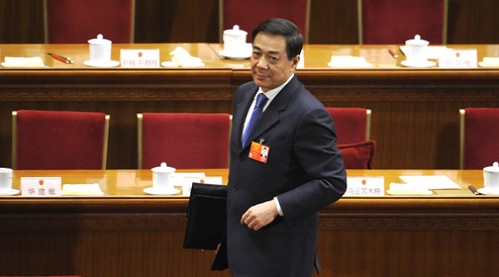
Bo Xilai, former Chinese Communist Party leader in Chongqing province. Mr. Bo was removed from his post at the recently-held National People's Congress. His wife is being charged with murder of a British businessman., a photo by Pan-African News Wire File Photos on Flickr.
Bo Xilai's political demise
Downfall, part two
Apr 11th 2012, 3:03 by T.P. | BEIJING
WITH plot twists worthy of a Chinese version of Macbeth, Communist Party officials announced late Tuesday night that disgraced politician Bo Xilai had been suspended from all his political duties, and named his wife as a suspect in the murder last year of a Briton living in China.
Mr Bo “is suspected of being involved in serious discipline violations” and will be formally investigated, according to a terse report released around 11pm by multiple state- and party-run media outlets. The Communist Party Central Committee had decided to “suspend” Mr Bo’s membership in that body, and in the more elite Political Bureau. A month ago, Mr Bo was removed from his post as party boss in Chongqing, a province-level municipality in south-western China.
A separate and more detailed announcement carried at the same time said that Mr Bo’s wife, Gu Kailai, together with a household staffer, was “highly suspected... of intentional homicide” in the death in Chongqing of British businessman Neil Heywood.
When Mr Heywood was found dead in a Chongqing hotel last November, authorities initially determined the cause to be an alcohol overdose. But yesterday’s announcement said that after a “reinvestigation” the case has been deemed a homicide.
The report said that both Gu Kailai and the couple’s son were on “good terms” with Mr Heywood, but that conflicts over economic interests had intensified. Ms Gu and the household staffer, named as Zhang Xiaojun, had already been transferred to judicial authorities, the report said.
The couple’s son, Bo Guagua, is currently enrolled as a university student in America and is thought to be there now. He had previously studied in Britain at some of the nation’s most prestigious private schools.
Until this year, Mr Bo, the son of a revered early Communist revolutionary, seemed on track for advancement to the highest levels of leadership. Before taking up his post in Chongqing, Mr Bo had served in a variety of senior jobs, including Minister of Commerce and governor of Liaoning Province.
He was among the most colourful of senior Chinese leaders, openly cultivating public support. He also spearheaded controversial and high-profile political campaigns against corruption and organised crime, and in favour of old-line Maoist slogans, songs and sensibilities.
The first public sign of high drama surrounding Mr Bo and his family emerged in February, when his close deputy, Wang Lijun, entered the American consulate in Chengdu, the capital of neighbouring Sichuan province, in what appeared to be an attempt at gaining asylum. He spent a full day there before being taken into custody by central-government authorities. Tight-lipped American officials would only say that he left the consulate "voluntarily".
In March, at the close of the annual session of China’s National People’s Congress, Mr Bo was the recipient of public and thinly veiled criticism from the prime minister, Wen Jiabao. A day later, he was removed from his post as leader of Chongqing. The drama has raised important questions about what the case might mean for the delicate equilibrium between the multiple factions at the top tier of Chinese politics.
It has been six years since a leader of Mr Bo’s stature has been suspended, and the precedents established over the past 30 years suggest Mr Bo has no viable path to any kind of political rehabilitation.
But he does retain a substantial following, both among the public and within political circles. Beyond his more flamboyant politicking, Mr Bo was appreciated as a provider of social welfare benefits to the masses who have found themselves on the losing end of China’s market reforms, and the reaction of his supporters to the latest developments will be something to watch.
The timing is especially sensitive because of the once-a-decade leadership transition scheduled for later this year. Ever fixated on maintaining stability—or at the very least the appearance of stability—the Communist Party had hoped that the transition process would play out more smoothly than this.
No comments:
Post a Comment